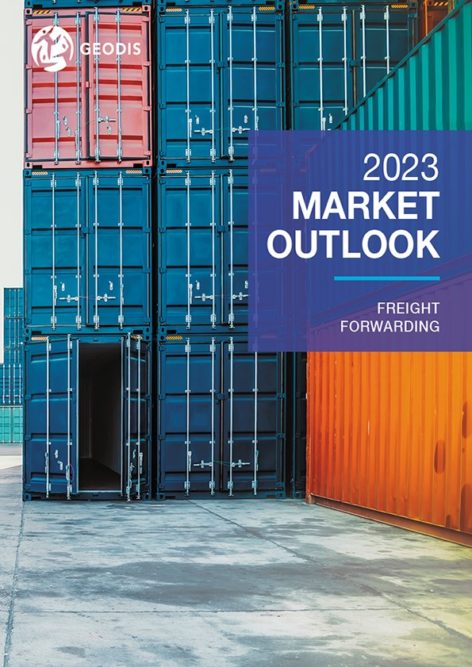
Home » 2023 Predictions/Market Outlook—Freight Forwarding
2023 Predictions/Market Outlook—Freight Forwarding

June 1, 2023
Are you prepared for the future of freight forwarding? Discover GEODIS’ groundbreaking insights and strategies in our latest white paper, 2023 Predictions/Market Outlook – Freight Forwarding.
The COVID-19 supply chain dislocations highlighted the capabilities and expertise of freight forwarders, leading them to new levels of creativity and initiative. Freight forwarding operations at GEODIS, the global third-party logistics (3PL) provider, focused on securing sufficient additional resources to overcome the massive challenges, including acquiring transportation assets. The additional assets and efforts required to get shipments through logjams called for higher levels of human resources, but freight forwarding suffered from the Great Resignation.
As demand for goods spiked, transportation and warehousing capacity were strained to the point that many containers could not be unloaded and put back into circulation, leading to shortages. GEODIS coped with these conditions by buying and leasing fleets of containers; chartering aircraft and ocean vessels; fielding over-the-road capacity between Southeast Asia and China; and running fixed-rotation air-charter services connecting Chicago with Europe, China with Mexico, and China, Hong Kong, Malaysia and India, with Australia. This network is now being supported by a GEODIS-leased aircraft fully operated by the forwarder. Now that freight markets are normalizing and rates are coming down, freight forwarders need to put efficiencies and cost reductions back into focus. GEODIS anticipated the eventual drop in demand and yield with a Big Transformation, by focusing on moving shipments faster, cheaper and better with a high quality of service.
With these conditions in mind, GEODIS is forecasting that 2023 will set a record low for intercontinental transportation demand. GEODIS is preparing for the future with an increased focus on automation, including implementations of optical character recognition (OCR) and robotic process automation (RPA) technologies. RPA will revolutionize the automation of business processes by promoting increased data connectivity between freight forwarders and their customers. The implementation of these technologies will have the effect of cutting costs, and boosting productivity and service quality, attributes that supply chains will need in abundance as they move forward into an uncertain future.
Join us in shaping the future of freight forwarding. Download the white paper today.
Please CLICK HERE to download the white paper.
RELATED CONTENT
RELATED VIDEOS
Subscribe to our Daily Newsletter!
Timely, incisive articles delivered directly to your inbox.
Popular Stories
Case Studies
-
JLL Finds Perfect Warehouse Location, Leading to $15M Grant for Startup
-
Robots Speed Fulfillment to Help Apparel Company Scale for Growth
-
New Revenue for Cloud-Based TMS that Embeds Orderful’s Modern EDI Platform
-
Convenience Store Client Maximizes Profit and Improves Customer Service
-
A Digitally Native Footwear Brand Finds Rapid Fulfillment




